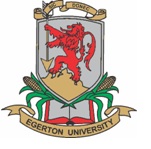Supporting the Government of Kenya's Bottom-Up Economic Transformation Agenda (BETA), Egerton University has launched the seventh cohort of its Agricultural Tractor Operator Training program, a transformative initiative focused on empowering women through mechanized farming.
At the launch event, Prof. Aduda emphasized the critical role mechanized farming plays in enhancing food security at the household and community levels. “Mechanized farming is a powerful tool for boosting food production, particularly for women. In Kisumu County, where I come from, the adoption rate of mechanized farming is low, contributing to Kenya’s national average of just 10% mechanized farming. This training provides a unique opportunity for women across select counties—Kisumu, Bomet, Nakuru, Kericho, Kisii, Nyamira, Laikipia, Uasin Gishu, and Elgeyo Marakwet—to gain essential skills and help secure food supply,” he said.

The initiative aligns with BETA’s commitment to increasing agricultural productivity and expanding economic opportunities for grassroots communities. By empowering women in small-scale farming with access to mechanized farming techniques, Egerton University is working to bolster Kenya’s food security and stimulate rural economies through practical skill development.
Prof. Aduda encouraged participants to become ambassadors for mechanized farming by sharing their skills within their communities, helping others to learn and benefit from this knowledge. He also expressed gratitude to the program’s partners, whose support has greatly enhanced the training’s reach and impact. Key partners include Hello Tractors, One Acre Fund, Kenya Investment Mechanism (KIM), John Deere, CFAO Kenya, Kubota, Massey Ferguson, Heifer International Kenya, CIWaB, and Egerton University’s Faculty of Engineering and Technology.
Prof. Japheth Onyando, Dean of the Faculty of Engineering and Technology, emphasized the importance of the training as a step toward gender inclusion in the field of mechanized agriculture. “Mechanized agriculture is typically male-driven, but this training is about changing that, ensuring women are equally involved,” Prof. Onyando said. He added that this initiative is necessary for achieving gender equity in agriculture and for allowing women to play an active role in mechanizing Kenya’s agricultural sector.
The training program’s curriculum blends practical and theoretical knowledge, covering areas such as tractor maintenance, handling, field operations, and advanced farming techniques. Dr. Patrick Wamalwa, Program Coordinator, explained that the two-week training period is designed to provide a solid foundation in tractor operation. "This training empowers women with the practical skills they need to become proficient tractor operators,” he noted, adding that the program also aims to connect participants to broader opportunities in Kenya’s agricultural mechanization value chain.
This push toward mechanization aligns with current trends in Kenya’s agriculture sector. According to the Agricultural Sector Survey by the Central Bank of Kenya, favorable rainfall in late 2023 and early 2024 led to increased agricultural productivity. The report stressed the need for expanded mechanization to ensure food security and resilience against climate variability. While Kenya’s mechanization rate has grown modestly—from 0.08 hp/ha in 1980 to 0.14 hp/ha in 2019—progress remains slower compared to countries like India. Programs such as Egerton’s Tractor Operator Training can help bridge this gap by introducing modern farming practices to more communities across Kenya.
Dr. Joseph Alele, an agricultural expert present at the launch, highlighted the importance of hands-on training in equipping communities to use mechanized tools effectively. “Mechanized farming can transform our agricultural landscape, improving yields and food security,” Dr. Alele said, emphasizing that continued investment in training will support Africa’s vision of becoming the “world’s breadbasket.”
By advancing Kenya’s BETA objectives, Egerton University’s program is crucial in advancing the Government of Kenya’s food security agenda, empowering women to drive change within their communities and strengthen Kenya’s agricultural sector.
As participants begin their two-week training, it is expected that their new skills will enable them to enhance productivity, contribute to rural development, and ultimately support Kenya’s vision of a self-sufficient agricultural economy.
By Kurian Musa
Communications Officer
Directorate of Marketing and Resource Mobilization
Egerton University
Email:
















